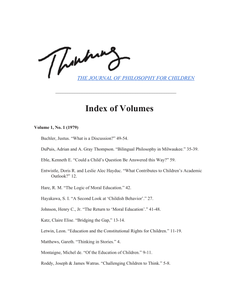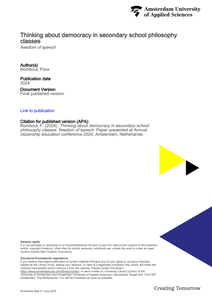The journal was a forum for the work of both theorists and practitioners of philosophical practice with children, and published such work in all forms, including philosophical argument and reflection, classroom transcripts, curricula, empirical research, and reports from the field. The journal also maintained a tradition in publishing articles in the hermeneutics of childhood, a field of intersecting disciplines including cultural studies, social history, philosophy, art, literature and psychoanalysis.
DOCUMENT

Philosophy is an elective subject in secondary education in the Netherlands, which is not often studied in the context of citizenship education. This is probably because only a minority of students participate in philosophy classes in the upper grades of secondary education (approximately 2-5% of all students). However, especially in the years 2022-2025 philosophy is particularly interesting for those studying how citizenship education can be taught, because the higher general track students study a range of philosophical ideas about democracy for their final exams (Spoelstra et al., 2021).This paper presents a qualitative analysis of three philosophy classes about freedom of speech. The lesson transcripts, pre- and post-observation interviews with 3 teachers and 15 students (5 from each class) are coded thematically with a framework for four teacher responsibilities during philosophical discussion in moral education. These four responsibilities are: teachers have an organizational responsibility to facilitate lesson activities such as classroom dialogue to facilitate thinking about democracy, an epistemic responsibility to warrant valid reasoning and recognition of established facts during the lesson, a pedagogic responsibility to create a safe and open classroom climate and a moral responsibility to find the right balance between value communication and stimulation (Leenders & Veugelers, 2004; Rombout et al., 2022; Sprod, 2001). The main research question was: how do philosophy teachers realize these four responsibilities to facilitate their students’ thinking about democracy in a lesson about freedom of speech and how to teacher and students evaluate these responsibilities in this lesson?The findings contain rich descriptions of lesson activities such as considering borderline cases, facilitating teacher-led dialogue, organizing debate, and learning about philosophers’ arguments. These are supplemented with reflections of the participants on teacher neutrality and how open and safe the classroom climate was during these lessons.
DOCUMENT

“Municipal Youth Work taken over by Christians”. (Binnenlands Bestuur, 2009) This heading refers to the work of Youth for Christ in an Amsterdam neighbourhood. This organisation, successful in Youth Work nationwide, last year came out first in an open competition of the Amsterdam district De Baarsjes. Because of this they were commissioned to undertake all the youth work in this multicultural neighbourhood. The conditions were not to evangelise and not to limit recruitment of personnel inside their own circle but to recruit from outside the organisation as well. When they later appeared to have put a job advertisement only on their own website, this led to heated debates. Finally Youth for Christ acknowledged and rectified this mistake. This example is a concrete illustration of the actual and sometimes delicate relationships between philosophy of life and social work
DOCUMENT

Philosophy for Democracy is a research project that aims to examine whether and how Philosophy with Children contributes to the development of democratic skills and attitudes. In the Netherlands, as in almost all Western countries, Philosophy with Children is linked with the movement for citizenship education. This article reports the research on the practice of Philosophy with Children. Sixteen philosophical inquiries by children in the classroom were recorded, transcribed and analysed. The analyses show that children develop relevant reasoning skills and advanced dialogical skills. The study shows that embedding Philosophy with Children in a democratic practice is necessary for contributing to a critical-democratic citizenship development. The study also shows that Dutch children often give their opinion, but are not often involved in inquiring their own opinions. From a pedagogical point of view, we think that in Dutch culture and in Dutch schools it would be important to stress more a dialogical – community-based – inquiring attitude. Om het artikel te lezen moet het gekocht worden: http://tandfonline.com/eprint/rGysRMaKEaXew7veJphB/full
DOCUMENT
The topic of this paper is the constructivism-realism debate, construed as an example of the intrusion of philosophy into science. Against this intrusion I maintain that philosophical problems are not only different from scientific and practical ones. They are also problematic in themselves. That is why their import into our scientific and practical work only creates confusions that hinder us in our work. The aim of the paper is to show that the philosophical problems that create those confusions need a Wittgensteinian therapeutic treatment. The method of the paper consists in comparing what philosophers (or philosophising scientists) say we do with what we actually do. After giving an example of what happens when a rightly respected scientist starts philosophizing, the method is applied, first, to the relation between language and the world and, second, to the relation between theories and the world. In the first application a story about three umpires is used to distinguish language and discourse, between questions of meaning (of the words we use) and questions of truth (of the things we say). In the second application a comparison between maps and theories is used to show the difference between assessing the truth of descriptive statements and explanatory theories. The examples of the umpires and maps are introduced by Weick and in both cases I show that neither constructivist nor metaphysical realist conclusions follow.
DOCUMENT

In secondary school philosophy classes students learn to reason critically about social and scientific issues. This study examined the effects of a whole-class, teacher-led philosophy classroom dialogue intervention on students’ value-loaded critical thinking. Value-loaded critical thinking is logically consistent, self-reflective reasoning focused on making moral value-judgments about what is right to believe or do. In a quasi-experimental study (N = 437 students) with a pre-test post-test design, we investigated whether engaging in classroom dialogues in which the teachers implemented five design principles for promoting value-loaded critical thinking and transfer thereof, positively affected students’ (n = 150) value-loaded critical thinking in transfer tasks. The results were compared to two comparison conditions: students (n = 149) who participated in regular teacher-led philosophy classroom dialogues and students (n = 145) who followed a regular 10th-grade curriculum without philosophy classes. Results showed that students in the intervention condition outperformed students in both comparison conditions on referring to moral values. Regarding critical reasoning, we only found significant effects compared to the students who followed the regular 10th-grade curriculum. Findings indicate that a specifically designed dialogic intervention can enhance students’ capacities in value-loaded critical thinking.
DOCUMENT

Most serious games have been developed without a proper and comprehensive design theory. To contribute to the development of such a theory, this article presents the underlying design philosophy of LEVEE PATROLLER, a game to train levee patrollers in the Netherlands. This philosophy stipulates that the design of a digital serious game is a multiobjective problem in which trade-offs need to be made. Making these trade-offs takes place in a design space defined by three equally important components: (a) Play, (b) Meaning, and (c) Reality. The various tensions between these three components result in design dilemmas and trilemmas that make it difficult to balance a serious game. Each type of tension is illustrated with one or more examples from the design of LEVEE PATROLLER.
LINK
In this paper we explore how the collaboration between Design Research and Philosophy of technology can be profitable for both disciplines. From three case studies where Philosophy of Technology theories and methods were applied in a design context we show how these projects profited from a more reflexive perspective. Then we analyse the three cases again to show how these design projects also lead to a better understanding from a Philosophy of Technology perspective. In putting the in principle rather abstract theories in design practice, the consequences become clearer and designing actual things thus provides a laboratory to test philosophical frameworks in real life. One can say that the Philosophy of Technology, besides thinking and talking, proceeds to action. Not only Philosophy of Technology with the head, but also Philosophy of Technology with the hands. Therefore, in analogy with the empirical turn in Philosophy of Technology before, we present this collaboration with design as the ‘Practical Turn in Philosophy of Technology’. In: Proceedings of DRS 2018: Design as a catalyst for change (Vol. I, pp. 190-200)
LINK
What is leisure? How does leisure relate to leading a good life? This critical and intelligent study interrogates the basic principles of leisure and demonstrates the continuing relevance of these questions for our society today. It not only explores the traditional philosophical concepts at the heart of leisure studies, but also pursues new possibilities for reconceptualising leisure that have emerged from recent developments in society, technology and the broader discipline of philosophy itself. Approaching leisure from a philosophically inquisitive perspective, the book argues that leisure revolves around the pursuit of happiness, human flourishing and well-being, making it both a state of mind and a state of being. Its exploration of the meaning of leisure addresses key issues such as identity, ethics, spirituality, human experience, freedom, technology, embodiment, well-being, the fundamental properties of leisure and the challenge of offering a meaningful definition. Revitalising the subject of leisure studies with its originality, Philosophy of Leisure: Foundations of the Good Life is fascinating reading for all students and scholars of leisure studies, philosophy, sociology, psychology and ethics.
DOCUMENT
Value-loaded critical thinking refers to a combination of critical thinking, moral value development and reflection. It is important to teach value-loaded critical thinking in secondary education and philosophy seems the pre-eminent subject to do so. This article describes the theoretical foundations of value-loaded critical thinking, its educational objectives, and what is known about effective teaching strategies. Value-loaded critical thinking is best taught in teacher-led philosophical dialogues. Four design principles summarize effective teaching strategies for teaching value-loaded critical thinking in dialogue: teachers should (1) explicitly address moral values in dialogue; (2) apply moral values to engaging or realistic examples; (3) promote critical reasoning about moral values; and (4) provide opportunities for reflection.It is important that secondary school students learn to reason critically about normative issues. Philosophy teachers can contribute to this educational objective by promoting value-loaded critical thinking during philosophical dialogues. Value-loaded critical thinking is critical and reflective reasoning focused on deciding what is the right thing to believe or to do (Frijters et al. 2008). This paper describes the theoretical foundations of value-loaded critical thinking and presents four design principles for promoting value-loaded critical thinking during philosophical dialogues. The four design principles are: teachers should explicitly address moral values in dialogue (1), apply moral values to engaging or realistic examples (2), promote critical reasoning about moral values (3), and provide opportunities for reflection (4). To provide authentic illustrations and practical suggestions for teachers, each design principle includes selected excerpts of classroom dialogues of 10th grade philosophy classes in Dutch.
DOCUMENT
